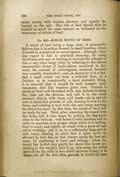A round of beef being a large joint, it necessarily follows that it is seldom dressed in small families, where it would be considered an extravagance; although, when due regard is had to practical economy, by using thriftiness and care in turning to account the remains of this or any other large joint, by referring to the almost innumerable forms of made-dishes contained in this work, the amount of extravagance incurred becomes very sensibly diminished; and, as moreover it is a fact, that a small round cut from a well-fed Scot, or a Durham ox is, occasionally, a most desirable thing, it is essential that it should be well dressed: pray remember, that this requires great care. Procure a round of beef well furnished with rich delicate-looking fat; take out the kernels, and salt it in the usual manner: that is, with clean, cold hands rub in and all over it about four pounds of salt, turning it over in the brine, and rubbing it well with the salt every morning for about ten days: by this time, the round of beef will be ready for use. Next, after removing the round from the brine, fold it into shape by pulling the flap-piece close to the buttock; well fasten it with skewers, and in order to maintain it in proper shape while it is boiling, bind it neatly and tightly all round with a piece of tape called webbing; put it on in a sufficiently large pot in cold water, bearing in mind that it must never be allowed to boil fast, as that always spoils the best salt meat, by rendering it hard and stringy: when the round, has boiled very gently for about five hours (according to the weight), take it up, trim away the soiled parts of the fat, stick in four silver skewers to keep it in shape, cut off the first slice, garnish it round the base with well-shaped boiled carrots and parsnips; pour some of its liquor coloured with a little browning over it, and serve a suet pudding, No. 293, or dumpling and summer cabbages in separate dishes. A sauce-boat filled with sauce piquante would prove rather a pleasant accompaniment to this brave old English solidity.
